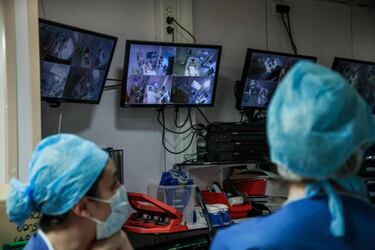Coronavirus: how do Covid-19 symptoms develop?
Common symptoms of coronavirus included a fever, dry cough and breathing difficulties but not everyone develops those symptoms.

With global cases of coronavirus infection close to reaching two million, researchers around the world have been studying patients to try and understand how the virus develops once the first symptoms appear.
Coronavirus common symptoms
Three different strains of the novel coronavirus are believed to be currently active around the globe: Types A, B and C – some apparently more virulent than others. The most common symptoms include fever, a tickley dry cough and shortness of breath – although some patients will develop just one or two of those symptoms. Other indicators of possible infection include mild headaches and stomach pains, but these are less common. Around 14% develop aches or joint pain.
Analysts believe that the vast majority (around 80%) of coronavirus infections produce mild symptoms, and in some cases, none at all. Only 3-5% of those who have contracted the virus go onto to develop serious problems requiring breathing aid or require intensive care. Those include the elderly, whose immune systems may not be able to fight off the virus or those with underlying health problems such as diabetes and cardiovascular issues.
The Covid-19 virus is spread through tiny droplets which are released into the air when an infected person sneezes or coughs into the open. Those droplets are able to hang, suspended in the air (when the air is still), much in the way cigarette smoke can linger when there is no breeze or air flow. Another way that infection is spread is when those droplets land on a hard surface where they can remain for several hours or days and are picked up by touch, then spread when the person touches their face. That is why it is important to regularly wash hands, avoid touching your face and use gloves when possible. The virus was found on the floor and door handles in a hospital in Wuhan, China, were the first patients were treated although several components of the virus are needed to infect a person and the droplets deteriorate in time.

Coronavirus incubation period
Once someone catches coronavirus, the incubation period can be anything from one to 14 days although usually, it is around five-six days.
Once inside the body, the virus multiplies rapidly in the throat causing soreness and a tickley sensation, a runny nose and sweating due to fever. When these symptoms appear, it is advised to rest, drink plenty of hot liquids and self-isolate to prevent others from contracting the virus. Cough or sneeze into a disposable handkerchief and immediately throw it away, or into the crease of your arm if you don’t have a tissue. Coughing into the open air will only spread the germs and increase the chances of infecting others. Wearing a protective mask will help to stop transmission.
Breathing difficulties when the lungs are infected by Covid-19
One of the dangers of the Covid-19 virus is when it spreads to the lungs where it can reproduce quickly and that causes the body’s immune system to kick in. To fight the infection, the body goes into overdrive, producing mucous which starts to cover the alveoli (the little sacs inside the lungs which allow oxygen to pass into the bloodstream). Once mucous production within the lungs reaches a certain point, the patient’s oxygen level falls, it becomes harder for them to breathe and the body will start to struggle to deliver oxygen to cells, tissues and organs. At this stage, patients will be given oxygen therapy to help maintain their O2 levels and give the body a chance to fight off the infection. If that procedure fails, the patient may need to be given breathing assistance via a ventilator. This occurs in around 3% of cases and if the patient’s condition is critical, they may develop pneumonia or a severe reaction by the body’s immune system which starts producing immune cells and proteins which can harm or destroy other organs such as the liver and kidneys.
Related stories
If you start showing early signs that you could be infected with coronavirus, contact your doctor, medical centre immediately to be tested.
